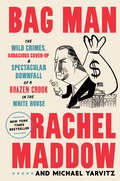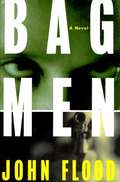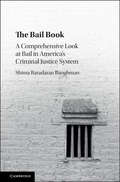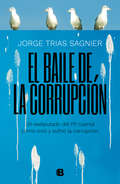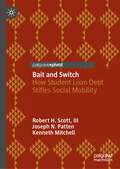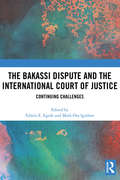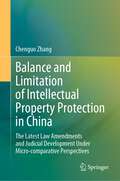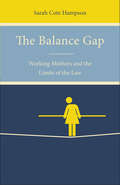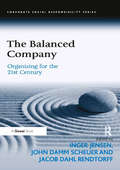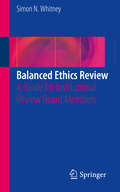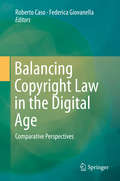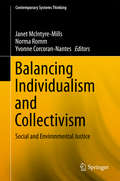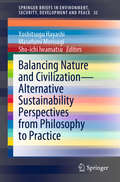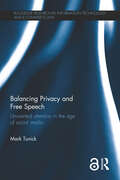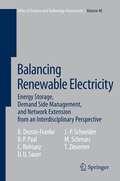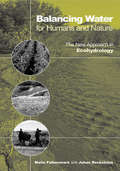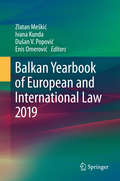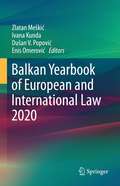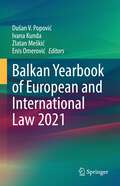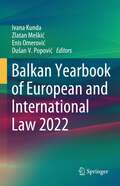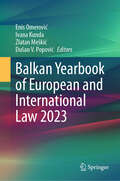- Table View
- List View
Bag Man: The Wild Crimes, Audacious Cover-Up, and Spectacular Downfall of a Brazen Crook in the White House
by Rachel Maddow Michael YarvitzThe knockdown, drag-out, untold story of the other scandal that rocked Nixon’s White House, and reset the rules for crooked presidents to come—with new reporting that expands on Rachel Maddow’s Peabody Award-nominated podcast <P><P>Is it possible for a sitting vice president to direct a vast criminal enterprise within the halls of the White House? To have one of the most brazen corruption scandals in American history play out while nobody’s paying attention? And for that scandal to be all but forgotten decades later? <P><P>The year was 1973, and Spiro T. Agnew, the former governor of Maryland, was Richard Nixon’s second-in-command. Long on firebrand rhetoric and short on political experience, Agnew had carried out a bribery and extortion ring in office for years, when—at the height of Watergate—three young federal prosecutors discovered his crimes and launched a mission to take him down before it was too late, before Nixon’s impending downfall elevated Agnew to the presidency. The self-described “counterpuncher” vice president did everything he could to bury their investigation: dismissing it as a “witch hunt,” riling up his partisan base, making the press the enemy, and, with a crumbling circle of loyalists, scheming to obstruct justice in order to survive. <P><P>In this blockbuster account, Rachel Maddow and Michael Yarvitz detail the investigation that exposed Agnew’s crimes, the attempts at a cover-up—which involved future president George H. W. Bush—and the backroom bargain that forced Agnew’s resignation but also spared him years in federal prison. Based on the award-winning hit podcast, Bag Man expands and deepens the story of Spiro Agnew’s scandal and its lasting influence on our politics, our media, and our understanding of what it takes to confront a criminal in the White House. <P><P><b>A New York Times Bestseller</b>
Bag Men
by John FloodSet in Boston on New Year's Day 1965, the body of George Sedgewick is discovered on a snow-covered runway at Logan Airport, brutally murdered.
The Bail Book: A Comprehensive Look at Bail in America's Criminal Justice System
by Baughman Shima BaradaranMass incarceration is one of the greatest social problems facing the United States today. America incarcerates a greater percentage of its population than any other country and is one of only two countries that requires arrested individuals to pay bail to be released from jail while awaiting trial. After arrest, the bail decision is the single most important cause of mass incarceration, yet this decision is often neglected since it is made in less than two minutes. Shima Baradaran Baughman draws on constitutional rights and new empirical research to show how we can reform bail in America. Tracing the history of bail, she demonstrates how it has become an oppressive tool of the courts that disadvantages minority and poor defendants and shows how we can reform bail to alleviate mass incarceration. By implementing these reforms, she argues, we can restore constitutional rights and release more defendants, while lowering crime rates.
El baile de la corrupción
by Jorge Trías SagnierJorge Trias Sagnier, exdiputado del PP, cuenta cómo vivió y sufrió la corrupción desde dentro del partido. El exdiputado del PP Jorge Trias Sagnier cuenta lo que vivió después de que el segundo juez instructor del caso Gürtel le pidiera que transmitiese a Rajoy y a la cúpula del PP que no interfirieran en la instrucción abierta. Trias Sagnier desempeñó un papel importante porque, al desvelar en un artículo publicado en El País la contabilidad B del Partido Popular, hizo que estallase uno de los mayores escándalos de corrupción de la democracia española. Un escándalo que nadie ha contado desde dentro, hasta ahora. El baile de la corrupción muestra el caso Gürtel y sus derivaciones a través de lo que Trias Sagnier vio por estar en contacto directo con Luis Bárcenas y la cúpula del partido. Al hacerlo, expone la intimidad de nuestra vida política y nos ayuda a comprender cómo actúan personajes de la relevancia de Rajoy, Aznar, Bárcenas, Trillo o Arenas, jueces como Garzón o algunos magistrados del Tribunal Supremo. Estamos, pues, ante un libro valiente y de interés general porque revela, de primera mano, el juego político del PP. «Hay situaciones en la vida de las que no te puedes desentender, te acompañan siempre. Y el hecho de haber participado en política es una de ellas. En mi caso, la trama Gürtel, con todo su complejo entramado jurídico y político, ya no me abandonaría nunca. Por más que quisiera alejarme, esta historia que me había mostrado con toda crudeza la cueva más oscura del Partido Popular, la cara más cruel y mezquina de la política, no quería soltarme. Sabía demasiado. Ya no tenía marcha atrás.»Jorge Trias Sagnier
El baile de la corrupción
by Jorge Trías SagnierJorge Trias Sagnier, exdiputado del PP, cuenta cómo vivió y sufrió la corrupción desde dentro del partido. El exdiputado del PP Jorge Trias Sagnier cuenta lo que vivió después de que el segundo juez instructor del caso Gürtel le pidiera que transmitiese a Rajoy y a la cúpula del PP que no interfirieran en la instrucción abierta. Trias Sagnier desempeñó un papel importante porque, al desvelar en un artículo publicado en El País la contabilidad B del Partido Popular, hizo que estallase uno de los mayores escándalos de corrupción de la democracia española. Un escándalo que nadie ha contado desde dentro, hasta ahora. El baile de la corrupción muestra el caso Gürtel y sus derivaciones a través de lo que Trias Sagnier vio por estar en contacto directo con Luis Bárcenas y la cúpula del partido. Al hacerlo, expone la intimidad de nuestra vida política y nos ayuda a comprender cómo actúan personajes de la relevancia de Rajoy, Aznar, Bárcenas, Trillo o Arenas, jueces como Garzón o algunos magistrados del Tribunal Supremo. Estamos, pues, ante un libro valiente y de interés general porque revela, de primera mano, el juego político del PP. «Hay situaciones en la vida de las que no te puedes desentender, te acompañan siempre. Y el hecho de haber participado en política es una de ellas. En mi caso, la trama Gürtel, con todo su complejo entramado jurídico y político, ya no me abandonaría nunca. Por más que quisiera alejarme, esta historia que me había mostrado con toda crudeza la cueva más oscura del Partido Popular, la cara más cruel y mezquina de la política, no quería soltarme. Sabía demasiado. Ya no tenía marcha atrás.»Jorge Trias Sagnier
Bait and Switch: How Student Loan Debt Stifles Social Mobility
by Robert H. Scott, III Joseph N. Patten Kenneth MitchellThis book traces how the student loan system has created insurmountable student debt traps for millions of student borrowers contrary to its original purpose of promoting social mobility. Today, approximately 45 million Americans hold over $1.7 trillion in student loan debt, with over 20% of borrowers in default. Student loan debt has the greatest negative impact of wealth-poor students, with Black and first-generation students less likely to attain a college degree, more likely to default on student loan debt, and less likely to gain the same type of wage premium from their college degrees than white student loan borrowers. The book also offers a wide range of policy solutions for remedying the student loan debt crisis.
The Bakassi Dispute and the International Court of Justice: Continuing Challenges
by Edwin E. Egede Mark Osa IgiehonOn the 10th of October 2002 the International Court of Justice delivered the Bakassi decision, which, amongst other things, excised the resource rich land and maritime territory of Bakassi from Nigeria and transferred its legal title to Cameroon. These two countries under the auspices of the United Nations established the mechanism of the Cameroon-Nigeria Mixed Commission to honour and implement their obligations under the ICJ decision. Over a decade after the ICJ decision this volume brings together academics and practitioners to assess the impact of this decision and the challenges and issues that have been raised in the course of its implementation. Hailed by some as a model of preventive diplomacy and a blueprint for the future, this timely assessment illuminates the difficulties in imposing such controversial decisions and considers whether this type of Mixed Commission is an adequate mechanism for implementing them.
Balance and Limitation of Intellectual Property Protection in China: The Latest Law Amendments and Judicial Development Under Micro-comparative Perspectives
by Chenguo ZhangThe book focuses the openness of Chinese copyright law and patent law, namely the right limitation and exception rules (as the IP-internal balancing mechanism) and the right enforcement and protection (as the IP-external balancing mechanism). It examines the highlights of the 3rd and 4th amendments to the Chinese copyright law, patent law and the trademark law, addressing the most debated questions during these amendments. This book also takes a comparative approach to study the legislations and case laws in the USA, EU and China. The comparison covers the legislation, case decisions, which could offer useful clues for legislators to revise the current law, for judges to decide the cases about relevant topics and lay down their market plans. Moreover, this study also provides several recommendations for the right holders who are currently operating or planning to operate in China, regarding the de facto protection levels of their IP rights, the risks of right infringement and litigation costs as well as the trend of the goalsetting in their intellectual property strategy.
The Balance Gap: Working Mothers and the Limits of the Law
by Sarah HampsonIn recent decades, laws and workplace policies have emerged that seek to address the "balance" between work and family. Millions of women in the U.S. take some time off when they give birth or adopt a child, making use of "family-friendly" laws and policies in order to spend time recuperating and to initiate a bond with their children. The Balance Gap traces the paths individual women take in understanding and invoking work/life balance laws and policies. Conducting in-depth interviews with women in two distinctive workplace settings—public universities and the U.S. military—Sarah Cote Hampson uncovers how women navigate the laws and the unspoken cultures of their institutions. Activists and policymakers hope that such family-friendly law and policy changes will not only increase women's participation in the workplace, but also help women experience greater workplace equality. As Hampson shows, however, these policies and women's abilities to understand and utilize them have fallen short of fully alleviating the tensions that women across the nation are still grappling with as they try to reconcile their work and family responsibilities.
The Balanced Company: Organizing for the 21st Century (Corporate Social Responsibility)
by Inger Jensen John Damm ScheuerToday’s organizations are embedded in global and local network relationships that demand more. They have to consider the importance to customers, investors and employees of being respected in wider society and behaving ethically, so it is increasingly important for companies to reflect systematically on how to balance profits with other criteria when making decisions and acting. In short, they need to learn how to become The Balanced Company. Requiring sustainability in production processes and ethical employment of the work force in suppliers' production facilities, at home and abroad, has resulted in new challenges. Strategists need to make balanced choices about long-term goals and the allocation of resources. They must analyse, understand and adjust strategies to market, political, value and technology-related changes. Communication specialists need to take the value systems and assumptions of stakeholders into consideration. Change specialists need to balance continuity and change. Meanwhile, managers make balanced decisions about control or trust; human resources design jobs to make them attractive as well as motivating, and marketers must consider what is important to consumers and stakeholders. Last but not least, leaders have to acknowledge that there are times when organizations have to be taken out of balance during change. The Balanced Company provides answers to corporately responsible and ethically driven balanced decision making. Read it to help your company and stakeholders identify what can be achieved and what to avoid, and about the processes by which values are taken into account and applied in practice.
Balanced Ethics Review: A Guide for Institutional Review Board Members
by Simon N. WhitneyThis manual will help Institutional Review Boards (IRBs) conduct ethics review that balances the major moral considerations in research with human subjects. Current challenges in the IRB environment are addressed with arguments and insights from dozens of scholars. Useful to the IRB member at any level of experience, Balanced Ethics Review provides the necessary tools needed to create a systemic blueprint for promoting the research and dissemination of scientists and scholars within the standard norms of regulation.
Balancing Constitutional Rights
by Jacco BomhoffThe language of balancing is pervasive in constitutional rights jurisprudence around the world. In this book, Jacco Bomhoff offers a comparative and historical account of the origins and meanings of this talismanic form of language, and of the legal discourse to which it is central. Contemporary discussion has tended to see the increasing use of balancing as the manifestation of a globalization of constitutional law. This book is the first to argue that 'balancing' has always meant radically different things in different settings. Bomhoff uses detailed case studies of early post-war US and German constitutional jurisprudence to show that the same unique language expresses both biting scepticism and profound faith in law and adjudication, and both deep pessimism and high aspirations for constitutional rights. An understanding of these radically different meanings is essential for any evaluation of the work of constitutional courts today.
Balancing Copyright Law in the Digital Age: Comparative Perspectives
by Roberto Caso Federica GiovanellaThis book focuses on the thorny and highly topical issue of balancing copyright in the digital age. The idea for it sprang from the often heated debates among intellectual property scholars on the possibilities and the limits of copyright. Copyright law has been broadening its scope for decades now, and as a result it often clashes with other rights (frequently, fundamental rights), raising the question of which right prevails. The papers represent the product of intensive research by experts, who employ rigorous interpretative methodologies while keeping an eye on comparison and on the impacts of new technologies on law. The contributions concentrate on the "propertization" of copyright; on the principle of exhaustion of the distribution right; on the conflict between users' privacy and personal data needs; and on the balance between copyright and academic freedom. Starting from the difficulties inherently connected to the difficult task of balancing rights that respond to opposing interests, each essay analyzes techniques and arguments applied by institutional decision-makers in trying to solve this dilemma. Each author applies a specific methodology involving legal comparison, while taking into account the European framework for copyright and related rights. This work represents a unique piece of scholarship, in which a single issue is read through different lenses, demonstrating the need to reconcile copyright with other fundamental areas of law.
Balancing Individualism and Collectivism: Social and Environmental Justice (Contemporary Systems Thinking)
by Norma Romm Janet Mcintyre-Mills Yvonne Corcoran-NantesThis book addresses the social and environmental justice challenge to live sustainably and well. It considers the consequences of our social, economic and environmental policy and governance decisions for this generation and the next. The book tests out ways to improve representation, accountability and re-generation. It addresses the need to take into account the ethical implications of policy and governance decisions in the short, medium and long term based on testing out the implications for self, other and the environment. This book recognizes the negative impact that humans have had on the Earth's ecosystem and recommends a less anthropocentric way of looking at policies and governance. The chapters discuss the geologic impact that people have had on the globe, both positive and negative, and brings awareness to the anthropocentric interventions that have influenced life on Earth during the Holocene era. Based on these observations, the authors discuss original ideas and critical reviews on ways to govern those who interpret the world in terms of human values and experience, and to conduct an egalitarian lifestyle. These ideas address the growing rise in the size of the ecological footprints of some at the expense of the majority, the growth in unsustainable food choices and of displaced people, and the need for a new sense of relationship with nature and other animals, among other issues. The chapters included in Balancing Individualism and Collectivism: Social and Environmental Justice encourage readers to challenge the sustainability agenda of the anthropocentric life. Proposed solutions to these unsustainable actions include structuralized interventions and volunteerism through encouragement and education, with a focus on protecting current and future generations of life through new governmental etiquette and human cognizance.
Balancing Nature and Civilization - Alternative Sustainability Perspectives from Philosophy to Practice (SpringerBriefs in Environment, Security, Development and Peace #32)
by Yoshitsugu Hayashi Masafumi Morisugi Sho-Ichi IwamatsuThis book is an outcome of an international symposium: Sustainability –Can We Design the Future of Human Life and the Environment? which was held as a satellite event of the “Love the Earth”-Expo 2005 (Aichi, Japan). Each chapter is based on the lecture given by the following eminent researchers: Yoshinori Ishii, Hans-Peter Dürr, Yoshinori Yasuda, Minoru Kawada, Yasunobu Iwasaka, Werner Rothengatter, Hisae Nakanishi, Yang Dongyuan, Lee Schipper, Itsuo Kodama, and Yoshitsugu Hayashi.In the Part I titled “A Sustainable Relationship between Nature and Humans”, we discuss what will become of fossil fuels and petroleum, and what kind of indicators should be used to monitor the energy expended by human society. We then discuss environmental impacts caused by different civilizations and values on Nature and ethics, based on the perspective of environmental archaeology and on the discussions by Kunio Yanagita, the father of Japanese folklore study.The Part II is titled and shows “International Conflict Concerning Environmental Damage and Its Causes”. The Asian dust (Kosa) is a typical example of transboundary conflicts between nations. Another example can be found in the EU’s attempt to put in place a common motorway toll system across EU countries having different geographical and economic conditions. Finally, Part III covers the opinions and further debates on sustainable future earth based on the lectures in Parts I and II.We hope that great insights in this book will come across to readers, and be of help in steering the world towards a sustainable society in harmony with biosystems on earth.
Balancing Privacy and Free Speech: Unwanted Attention in the Age of Social Media (Routledge Research in Information Technology and E-Commerce Law)
by Mark TunickIn an age of smartphones, Facebook and YouTube, privacy may seem to be a norm of the past. This book addresses ethical and legal questions that arise when media technologies are used to give individuals unwanted attention. Drawing from a broad range of cases within the US, UK, Australia, Europe, and elsewhere, Mark Tunick asks whether privacy interests can ever be weightier than society’s interest in free speech and access to information. Taking a comparative and interdisciplinary approach, and drawing on the work of political theorist Jeremy Waldron concerning toleration, the book argues that we can still have a legitimate interest in controlling the extent to which information about us is disseminated. The book begins by exploring why privacy and free speech are valuable, before developing a framework for weighing these conflicting values. By taking up key cases in the US and Europe, and the debate about a ‘right to be forgotten’, Tunick discusses the potential costs of limiting free speech, and points to legal remedies and other ways to develop new social attitudes to privacy in an age of instant information sharing. This book will be of great interest to students of privacy law, legal ethics, internet governance and media law in general.
Balancing Renewable Electricity: Energy Storage, Demand Side Management, and Network Extension from an Interdisciplinary Perspective (Ethics of Science and Technology Assessment #40)
by Christian Rehtanz Bert Droste-Franke Jens-Peter Schneider Miranda Schreurs Dirk Uwe Sauer Thomas Ziesemer Boris P. PaalAn important aim behind the restructuring of Germany's and Europe's electricity systems is to reduce the environmental burden, especially with respect to greenhouse gas emissions, of the current systems. Emissions must be brought down to a level that is sustainable in the long run and consistent with greenhouse gas emission reduction goals. Meeting these goals will require a system (as best as current knowledge suggests) that will be able to cope simultaneously with the fundamental demands for economic efficiency, environmental sustainability and supply security. Making use of existing scenarios, this study sketches such a system. It focuses in particular on auxiliary systems such as energy storage methods and network extensions. The study introduces technologies that can balance electricity in energy systems and that can serve as enabling technologies for the integration of large quantities of renewable energies in the power supply system. It begins with a discussion of normative aims for the future electricity system before continuing with a description of current policies and political developments and an overview of relevant existing energy system studies. These sections serve as background for the remainder of the study. They are followed by discussion and analysis of the growing demand for means to balance the fluctuations found in electricity generated in power systems with a high penetration of renewable energies, the potentials of diverse technologies, requirements for electrical networks, economic impacts and important legal issues. Finally, the main challenges to the achievement of developing balancing technologies and processes for renewable electricity-dominant systems are summarised and recommendations made.
Balancing Water for Humans and Nature: The New Approach in Ecohydrology
by Johan RockstromBalancing Water for Humans and Nature, authored by two of the world's leading experts on water management, examines water flows - the 'blood stream' of both nature and society - in terms of the crucial links, balances, conflicts and trade-offs between human and environmental needs. The authors argue that a sustainable future depends fundamentally on our ability to manage these trade-offs and encourage long-term resilience. They advocate an ecohydrological approach to land/water/environmental problems and advance a strong, reasoned argument for viewing precipitation as the gross fresh water resource, ultimately responsible for sustaining all terrestrial and aquatic ecosystem services. This book makes the most coherent and holistic argument to date for a new ecological approach to understanding and managing water resources for the benefit of all. Basing their analysis on per capita needs for an acceptable nutritional diet, the authors analyse predictions of the amounts of water needed for global food production by 2050 and identify potential sources. Drawing on small-scale experiences in Africa and Asia, they also cover the vulnerability of the semi-arid tropics through a simplified model of green and blue water scarcity components.
Balco Atlantico
by Jérôme FerrariIn a village square in Corsica lies the body of ardent nationalist, Stéphane Campana, shot down at close range. And over his body weeps Virginie, the young woman who has venerated Stéphane all her life - a veneration that has led her to abandon herself to him and his twisted desires completely.Meanwhile, brother and sister Khaled and Hayet, who once gazed out to sea from the shoreline path known as "Balco Atlantico" and dreamed of a better future, are now stranded in Corsica. As Ferrari traces the history of Stéphane and Virginie that leads to the shooting in the village square, we encounter the story of Khaled and Hayet and see through their story and the stories of many others in this one Corsican square how a relentless pursuit of happiness and fulfilment can bring us perilously close to despair and disillusionment.
Balco Atlantico
by Jérôme FerrariIn a village square in Corsica lies the body of ardent nationalist, Stéphane Campana, shot down at close range. And over his body weeps Virginie, the young woman who has venerated Stéphane all her life - a veneration that has led her to abandon herself to him and his twisted desires completely.Meanwhile, brother and sister Khaled and Hayet, who once gazed out to sea from the shoreline path known as "Balco Atlantico" and dreamed of a better future, are now stranded in Corsica. As Ferrari traces the history of Stéphane and Virginie that leads to the shooting in the village square, we encounter the story of Khaled and Hayet and see through their story and the stories of many others in this one Corsican square how a relentless pursuit of happiness and fulfilment can bring us perilously close to despair and disillusionment.
Balkan Yearbook of European and International Law 2019 (Balkan Yearbook of European and International Law #2019)
by Ivana Kunda Dušan V. Popović Zlatan Meškić Enis OmerovićThe first issue of the Balkan Yearbook of European and International Law (BYEIL) focuses on international commercial and investment arbitration as one of the fastest developing fields of law in Southeast Europe. Covering a range of topics, the contributions analyze transparency and confidentiality in international commercial and investment arbitration in national, EU and international contexts. In addition, it compares the commercial arbitration laws and rules in Bosnia and Herzegovina with the international developments in this area.The papers published in the permanent sections on European Law and International Law explore contemporary challenges in public and private law disciplines, offering new perspectives on old concepts.
Balkan Yearbook of European and International Law 2020 (Balkan Yearbook of European and International Law #2020)
by Zlatan Meškić Ivana Kunda Dušan V. Popović Enis OmerovićThe second volume of the Balkan Yearbook of European and International Law (BYEIL) focuses on the United Nations Convention on Contracts for the International Sale of Goods (CISG), which was signed 40 years ago. The contributions analyse a broad range of aspects and reflect the latest developments; those in the permanent sections on European Law and International Law explore contemporary challenges in public and private law disciplines, offering fresh new perspectives on established concepts.
Balkan Yearbook of European and International Law 2021 (Balkan Yearbook of European and International Law #2021)
by Dušan V. Popović Ivana Kunda Zlatan Meškić Enis OmerovićThis third volume of the Balkan Yearbook of European and International Law (BYEIL) is devoted in particular to the specific legal challenges faced by Southeast European countries in the area of intellectual property law. The authors discuss a range of topics in Serbian and Bosnian and Herzegovinian copyright law, trademark and patent law, the relevance of which extends beyond their national borders. The papers included in the permanent sections on European law and international law explore contemporary challenges in public and private law. These challenges concern various legal fields, including consumer law, commercial law, corporate and criminal law, and the corresponding papers tackle a number of fundamental theoretical issues, while also highlighting the latest developments in legal practice.
Balkan Yearbook of European and International Law 2022 (Balkan Yearbook of European and International Law #2022)
by Ivana Kunda Zlatan Meškić Enis Omerović Dušan V. PopovićThe fourth volume of the Balkan Yearbook of European and International Law (BYEIL) presents nine new articles offering scholarly insights into a variety of legal issues, with a special focus on the countries of Southeast Europe. All six articles in the special section reflect the authors’ efforts to untangle difficult questions concerning family property in private international law. Addressing a range of topics, leading national experts in the respective areas discuss Bosnian and Herzegovinian, Croatian, Greek, Lithuanian and Turkish law. In turn, the general sections on European law and international law include three articles on diverse topics in private and public law, from a fresh take on the legal and practical effects of Brexit over EUTMs, and the legal nature of cryptocurrencies in different jurisdictions, to difficulties establishing the rule of law in Bosnia and Herzegovina.
Balkan Yearbook of European and International Law 2023 (Balkan Yearbook of European and International Law #2023)
by Enis Omerović Ivana Kunda Zlatan Meškić Dušan V. PopovićThe fifth volume of the Balkan Yearbook of European and International Law (BYEIL) discusses diverse and actual legal topics of international and comparative dimensions and angles. The BYEIL 2023 focuses on the special topic of Human Rights at Multiple Levels and contributes to the extensively researched field characterised by emerging trends, with the authors providing a deeper and more concise understanding of human rights-related issues. Discussions surrounding indivisibility, interdependence, universalism versus cultural relativism inevitably led to exploring human rights at various levels. The two permanent sections on European Law and International Law deal with recent developments in these highly dynamic and developing areas. They serve as a forum for scholarly discourse on these topics from the South-East European perspective.
